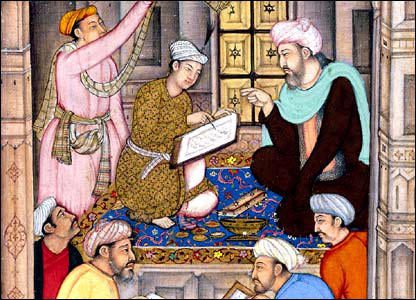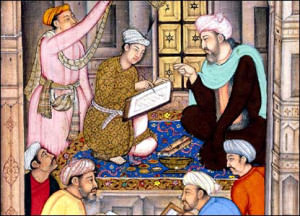Ramadan: Do This in Memory of Me

To celebrate interfaith friendship and St. Francis’ history with Islam, Franciscan Fridays is starting a series on Ramadan. Check back every Friday though August 17 for posts by Fr. Michael Calabria, OFM.
 |
| A master instructs a scribe. India, ca. 1590 |
On the stone altar in the church of my parents’ parish in Florida, on the surface facing the congregation, is inscribed: “Do this in memory of me,” quoting Jesus’ words at the Last Supper (Luke 22.19 & 1 Cor. 11.24-25). It’s a simple yet powerful reminder, not only of the life and ministry of Christ, but of our baptismal call to be disciples of Christ, to embody his life and ministry in our own. We remember Christ and who we have been called be in a meal, in eating and drinking together, as a community.
For Muslims, Ramadan is a time when they too are called to remember the Word of God (as revealed in the Qur’an) by fasting, by depriving themselves of food and drink during the daylight hours. They are called to remember what it means to be Muslim – literally, “those who submit” to God. Ramadan (and indeed all Muslim practice) is about remembrance.
For those who fast, hunger and thirst is first of all a reminder of our utter fragility as creatures, made from the stuff of the earth. The very first verses of the Qur’an revealed to the Prophet Muhammad (peace be upon him) was a reminder of this: “Proclaim in the name your Lord, who created, who created humanity from a clot…” (96.1-2). The first thing God reminded humanity of in the Qur’an was our utter humility.
When I fast, my empty stomach and dry tongue remind me of just how vulnerable I am, and how dependent I am on food and drink, the bounty of the earth which God has provided. I am reminded of how precious and fragile my life, all lives and all life really are.
I remember how sura (chapter) 96 of the Qur’an continues: “Proclaim! And your Lord is most Generous, who taught humanity by means of the pen, who taught humanity what they know not.” No sooner have we been reminded of our humble origins than we are reminded of our God-given capacity to learn, that we are not merely flesh and bone, but we are mind as well.
As fasting reminds me of my human frailty, so studying, reading and writing remind me of human dignity. While intellectual endeavors have sometimes denigrated in faith traditions as a kind of distraction from God, the Qur’an reminds us that learning is in itself a divine activity, an integral part of what it means to be human.
I remember the Creation story as related in the Qur’an, how God “taught Adam the names of all things” (2.31) and commanded the Angels to bow down to this noble clay creature He had fashioned. Utter humility and utter nobility. Divine dust. Even after humanity “slipped,” as the Qur’an describes the Fall, God turns to this noble, fragile creature and teaches us again ”for He is the One who continuously turns (to us), and is the Most Merciful” (2.36-37).
“Do this in memory of me.” Eat, drink, fast, live, learn and remember. Do all things in memory of the God who creates us, teaches us and turns to us. May we be mindful creatures and attentive students.
Fr. Michael Calabria, OFM is a Franciscan friar of Holy Name Province. For the past nine years he has taught Arabic and Islamic Studies at St. Bonaventure University, and is currently pursuing his doctorate in Arab and Islamic Studies with the University of Exeter, UK, and serving as a chaplain-in-residence at Georgetown University. Fr. Michael has lived, ministered and taught in Egypt, has traveled extensively in the Middle East, and speaks widely on Islam, Middle Eastern Affairs, and Christian-Muslim Relations.
Tagged in:

